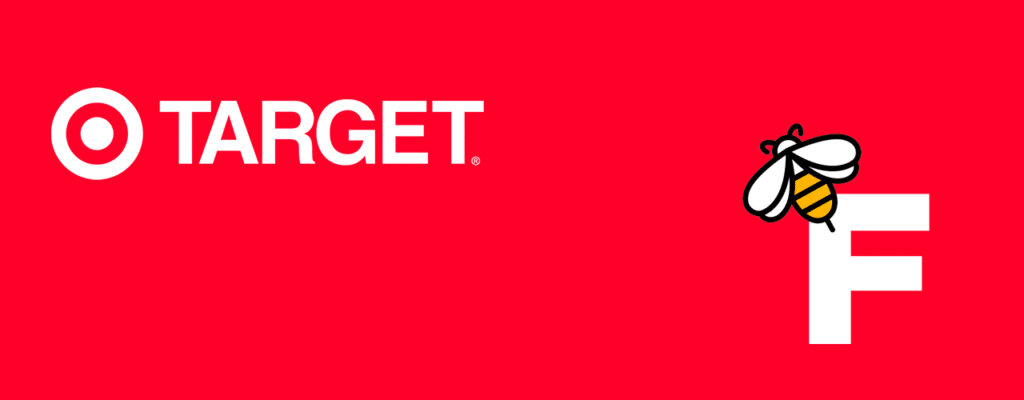
Target
Summary of Target grade

Pollinator Health Policy
12 out of 45 points
In July 2021, Target released a written, publicly available pollinator health policy. The policy encourages all produce, live plant and flower suppliers to transition away from neonicotinoids and chlorpyrifos and to avoid regrettable substitutes, or the replacement of one hazardous pesticide with another. The policy also encourages these suppliers to employ integrated pest management (IPM) strategies. Live plant suppliers are encouraged to label pollinator-friendly plants grown without neonicotinoids, flupyradifurone and sulfoxaflor. In addition, Target committed to track vendor use of pesticides on store properties to understand where neonicotinoids are being used and to develop safer pest management practices.
Target’s policy does not include any timebound or measurable commitments to phase out pesticides of concern or expand the adoption of least-toxic practices in its food or beverage supply chains. The policy also does not include a commitment to expand organic offerings.
Commitment to reduce pesticide use
6 out of 15 points
Avoiding regrettable substitutes
5 out of 5 points
Commitment to least-toxic approaches in non-organic supply chains
1 out of 10 points
Commitment to organic
0 out of 15 points

Implementation
5 out of 90 points
Target’s 2016 Corporate Social Responsibility report states that Target set a goal to increase organic offerings by 25% which resulted in a 139% increase in organic offerings. Target did not continue reporting on organic expansion in its 2017 or 2018 annual reports. Friends of the Earth recommends that Target provide an updated report on the state of organic offerings.
Target has not taken any other discernable action to reduce use of pesticides of concern to pollinator and human health or expand organic farming and other least-toxic approaches in its supply chains. The actions we evaluated include: 1) tracking use of pesticides in company supply chains, 2) measurably reducing pesticide use in the past three years and publicly reporting on data, 3) supporting farmers in non-organic supply chains to shift to least-toxic approaches such as integrated pest management and regenerative agriculture, 4) measurably expanding organic offerings in the past three years, 5) demonstrating support for U.S. growers to transition to organic farming, and 6) demonstrating advocacy for public policies aimed at reducing agricultural pesticide use, protecting pollinators and supporting the expansion of organic agriculture in the U.S.
Track pesticide use in supply chain
0 out of 10 points
Measurably reduce pesticide use
0 out of 15 points
Prioritize least-toxic approaches in non-organic supply chains
0 out of 20 points
Prioritize USDA certified organic
5 out of 25 points
Support domestic organic growers
0 out of 15 points
Support public policies
0 out of 5 points

Transparency & Accountability
6 out of 21 points
Target’s pollinator health policy is publicly available online. Target provides a definition of USDA organic on its webpage.
Target does not have a publicly available commitment to expand organic offerings. Target does not appear to include reduction of pesticides of concern to pollinators and human health or expansion of organic offerings in company Key Performance Indicators or other formal sustainability criteria. Target does not have educational content online about the value to pollinator and human health of decreasing use of toxic pesticides and expanding organic offerings.
Make policies and commitments publicly available
4 out of 6 points
Oversight
0 out of 5 points
Educate consumers
2 out of 10 points

Collaboration
0 out of 10 points
Target has not communicated with Friends of the Earth in the past year. Target has not briefed Friends of the Earth on meaningful action the company has taken on pesticides and pollinator protection in the past three years.

Complimentary Home & Garden Policies
0 out of 9 points
Target has not made a public commitment to reduce or phase out use of neonicotinoids in live goods and garden plants. Target has not made a public commitment to remove neonicotinoid or glyphosate products from store shelves.
Policy for live goods
0 out of 4 points
Policy for on-shelf pesticide products
0 out of 5 points

Bonus Points
0 out of 40 points
23 Points
F
grade